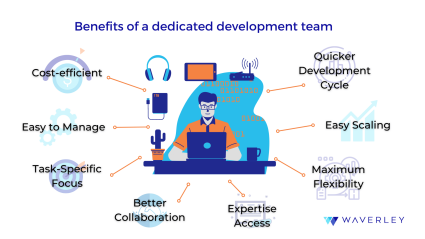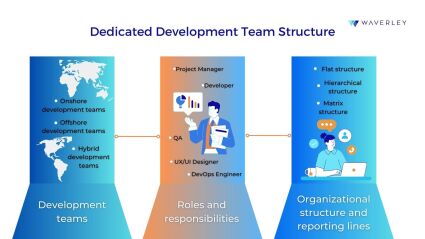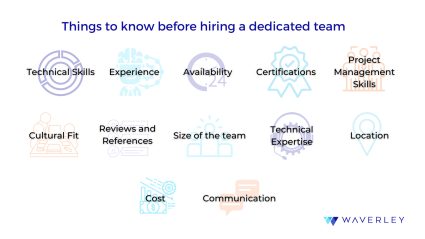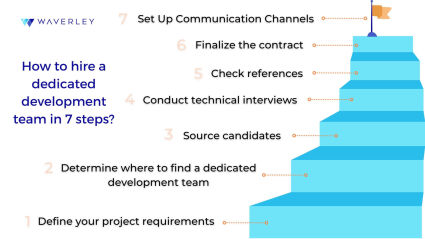How to Hire a Dedicated Development Team in 2024

Contents
In today’s rapidly evolving technology landscape, hiring a dedicated development team from an external vendor has become an essential aspect of businesses looking to stay ahead of the competition. With the ongoing Covid pandemic changing the way we work, remote teams have become the norm, making it easier than ever to hire skilled developers all around the globe. In this article, we will explore the benefits of hiring a dedicated development team and provide a step-by-step guide on how to go about finding the right team for your business needs in 2024. From identifying your project requirements to choosing the right team structure, we will cover all the critical factors that need to be considered to ensure the success of your project.
Covid has impacted the demand for dedicated development teams, causing a shift towards remote teams and accelerating the need for businesses to have a robust digital presence. Many businesses in Healthcare, Manufacturing, Finance, Automotive and Insurance rely on outsourced software development teams to deliver mission-critical software. As the competition continues to grow, hiring a dedicated development team has become crucial in achieving long-term success and staying ahead of the curve. That’s why in this article we’ll highlight the benefits, challenges, and best practices that can help businesses achieve their goals in a rapidly evolving technological landscape.
What Is a Dedicated Development Team?
A dedicated development team is a group of software developers, designers, and other IT professionals who work exclusively on a particular project or set of projects for a client. This team is hired on a long-term basis and works closely with the client to meet their specific project requirements.
There are many differences between a dedicated development team and other engagement models, such as fixed-price or time and materials like:
- The level of control and flexibility that the client has over the development process (because of the freedom the client has with a dedicated team to set priorities, alter the project’s scope, and change the team’s size and structure in response to changing needs)
- The level of expertise and focus that a dedicated development team can provide. (The team can gain a thorough understanding of the client’s business objectives, technical needs, and industry context by focusing solely on one project. This may result in more effective development procedures, higher-caliber deliverables, and improved client-development team collaboration)
Software Engineering is the biggest area to be outsourced, with 13.6% of IT budgets dedicated to outsourcing and 37% of IT tasks being outsourced globally, according to Zippia. In summary, a dedicated development team offers a highly collaborative, agile, and scalable approach to software development that might be a suitable fit for companies with complicated, long-term projects and dynamic requirements.
Who Needs a Dedicated Development Team?
The short answer: For a variety of enterprises, a dedicated development team can be a great asset since they provide a high degree of experience, flexibility, scalability, and affordability. A specialized development team can help you reach your IT objectives and advance your company, regardless of whether you are a startup, small to medium-sized corporation, or enterprise, and regardless of whether you have internal development resources or not.
The long one: From small startups to established corporations, a dedicated development team might be a great choice to either supplement your in-house IT team or develop a separate standalone project. A specialized software development team may be advantageous for the following companies:
- Startups: Startups may lack the internal resources necessary to assemble a development team from scratch. They are often facing budget pressure, so hiring an offshore dedicated development team that’s highly scalable and knowledgeable can be a game-changer. A committed team can provide the appropriate level of responsiveness to highly dynamic needs in a changing environment. 50% of Waverley’s clients are startups at various stages.
- Small to medium-sized businesses: This type of business might not have the funds or resources to hire a full-time development staff, but they might still have ongoing IT requirements that call for knowledge and care. Without the commitment of hiring full-time personnel, a dedicated development team can offer a cost-effective solution to satisfy these objectives. Additionally, it can provide the required degree of scalability to meet evolving business needs over time.
- Enterprises: Bigger organizations frequently have intricate, protracted IT projects that demand a high level of knowledge and domain expertise. In order to properly manage these projects and guarantee that they are finished on time and under budget, a specialized development team can offer the tools and knowledge required. Therefore, a specialized team can offer the essential amount of flexibility to suit an enterprise’s needs for a high level of customisation and interaction with existing systems. Besides, hiring a team from a company like Waverley will allow businesses to tap into a broad range of industry-specific experience, as our engineers have worked on a number of products for a range of industries.
- Businesses with limited internal IT resources: Due to their insufficient internal IT resources, some firms may find it difficult to properly manage complicated IT initiatives. Without the need to hire full-time workers, a committed development team can and will offer the knowledge and tools required to finish these tasks. Furthermore, can provide continuous support and maintenance to guarantee that the project stays current and operational throughout time. In addition, when it comes to support & maintenance, hiring mixed teams in various locations (Waverley has developers on several continents) will provide for round-the-clock support.
Benefits of a Dedicated Development Team

According to a study by PA Consulting, 63% of companies in the UK plan to outsource their software development at the same rate or more in the next two years, and cost is no longer the primary reason for this. The new top driver for this decision is the need for skilled resources, of which there’s a shortage in the UK. For companies looking to create and maintain software solutions, a dedicated development team can offer a variety of advantages. Businesses may meet their IT goals and stay ahead of the competition with the support of a team like this, which can also increase flexibility and scalability and improve communication and collaboration.
Let’s look into the top benefits of hiring a dedicated development team, and how businesses can leverage these benefits to drive innovation, increase efficiency, and achieve long-term success.
- Cost-efficiency
One of the main advantages of having a committed development team is cost efficiency. Software development can be done more predictably and affordably with a dedicated offshore or nearshore workforce as compared to other engagement models, such as fixed-price or time-and-materials. Why? Because working exclusively on a particular project, the team can optimize their processes, reduce waste, and minimize unnecessary expenses. Engineering rates in other parts of the world are much lower than in the US or Western Europe, which is why outsourcing your software development to a dedicated team offshore can make a big financial difference. Also, a dedicated team can offer a high level of expertise and productivity, enabling businesses to complete projects more quickly and efficiently. This can translate into significant cost savings over time, particularly for long-term projects with evolving requirements. - Easy Management
Easy management is another key benefit because compared to managing individual contractors or freelancers, a dedicated team can provide a more streamlined and centralized approach to project coordination. The team usually has a specialized project manager who serves as the client’s primary point of contact, organizes tasks, and keeps the project on schedule. This can make the process of working together and communicating easier, which will help firms manage their development projects and make sure that everyone is pursuing the same objectives. Adding a dedicated team can offer a high level of accountability and transparency, with regular progress updates and feedback, making it easier for businesses to stay informed about project status and make informed decisions about future directions. - Task-Specific Focus
A dedicated development team is entirely concentrated on the project at hand, as opposed to working with independent contractors or a broad software development company. This makes the team very skilled in creating solutions that satisfy the project’s needs and helps to make sure the team has a thorough understanding of the business objectives, business peculiarities and potential risks. Because the team members are committed to the project, they can give it their complete focus and knowledge. This targeted strategy enables quicker development timelines, better work, and more effective resource management. To keep the project current and functional throughout time, this team can provide continuous support and maintenance. - Better Collaboration
This promotes greater efficiency and productivity by ensuring that everyone is aware of the project’s objectives, deadlines, and deliverables. A committed team also frequently has a greater stake in the project’s accomplishment, which boosts drive and dedication. This may lead to quicker development periods and higher quality work. Additionally, committed staff can provide more openness, responsibility, and feedback on a frequent basis. This can aid in the early detection of possible problems, enabling fast resolution and reducing the possibility of project delays or failure. - Quicker Development Cycle
The team can concentrate all of their efforts on one project because they only work on that one project, which leads to quicker development timelines. The team can sustain a rapid pace of development without compromising quality since they are able to swiftly respond to changes in project needs and modify their processes accordingly. A committed staff can also give a higher degree of efficiency and knowledge, allowing them to execute jobs faster and more successfully. Businesses may be able to go to market faster as a result, keeping them one step ahead of the competition and allowing them to take advantage of new market opportunities. Additionally, a shorter development cycle can help to lower project costs and shorten the time it takes to market, enabling businesses to accomplish their IT objectives more successfully and effectively. - Expertise Access
A dedicated team typically consists of skilled and experienced professionals with a deep understanding of software development processes and technologies, right? This level of expertise can be challenging to find in individual contractors or freelancers, or even in-house IT teams. A McKinsey study has revealed that 87% of respondents are either facing talent shortages now or expect them in the near future. Businesses can use the skills of a dedicated development team to create high-quality software solutions that satisfy their particular needs by employing the team and can use the team’s knowledge to spot possible problems early, put best practices into place, and streamline the development process for optimum effectiveness and productivity. The committed dev squad can also offer continuous support and maintenance, ensuring that the software stays current and useful over time. When it comes to software development, having access to a high degree of expertise can help organizations stay ahead of the curve, enabling them to innovate and take advantage of new technologies to boost long-term success. - Maximum Flexibility
For this benefit, a dedicated team can offer a high level of flexibility in terms of project scope, timelines, and resource allocation. This means that businesses can adjust the team’s resources and priorities as needed to ensure that the project meets their specific requirements. Also, they can adapt quickly to changes in project requirements, ensuring that the project remains on track and aligned with the business’s goals. The team can closely collaborate with the company to pinpoint any problems or difficulties and provide recommendations for how to best streamline the development process for optimal effectiveness and productivity. A committed team may also offer continuing support and maintenance, guaranteeing that the software will stay current and work properly over time. This maximum flexibility can assist firms in making the best use of their resources, lowering project costs, and more effectively and efficiently achieving their IT goals. - Easy Scaling
The committed team can easily scale up or down depending on the demands of the business, making sure that the project stays in line with the aims and objectives of the organization. Many of Waverley’s clients ask for part-time developers, designers or testers, to complete tasks of limited duration. This scalability might be crucial for firms experiencing rapid growth or ones with shifting project requirements. As a result, this team is able to respond to these changes rapidly, adding resources or changing their procedures as necessary to keep the project on schedule. This simple scalability can assist firms in resource optimization, reduced project costs, and improved IT target achievement. Through innovation and the exploitation of cutting-edge technology, organizations may stay ahead of the curve in terms of software development with the aid of this simple scalability.
Dedicated Development Team Structure

Dedicated development teams come in a variety of forms, each with their own duties, responsibilities, organizational structures, and reporting lines. Typical forms of committed development teams include:
- Offshore development teams: Most of the time, offshore development teams are situated in a different nation than the client organization. Because salaries and operating expenses may be lower abroad than in the country where the client company is based, these teams may result in cost savings. Depending on the needs of the project, the team may consist of developers, quality assurance engineers, project managers, and other specialists.
- Onshore development teams: Typically, onshore development teams are situated in the country where the client company is based. Because they have a common language and culture, these teams can provide improved communication and collaboration. Depending on the needs of the project, the team may consist of developers, quality assurance engineers, project managers, and other specialists.
- Hybrid development teams: Onshore and offshore team members combine to form hybrid development teams. This concept enables a balance between financial savings and successful teamwork and communication. The project manager and other important team members typically work from onshore locations, while other team members are situated offshore.
The roles and responsibilities of team members can vary depending on the specific project requirements but some common roles include:
- Project Manager: responsible for overseeing the project and ensuring that it is completed on time, within budget, and to the client’s satisfaction.
- Developer: in charge of writing the code for the software application, ensuring that it meets the project requirements and is scalable, maintainable, and secure.
- Quality Assurance Engineer: tests the software application to ensure that it is free of bugs and meets the project requirements.
- UX/UI Designer: designs the user interface and user experience for the software application, ensuring that it is intuitive, user-friendly, and visually appealing.
- DevOps Engineer: in charge of managing the infrastructure and deployment of the software application, ensuring that it is secure, scalable, and reliable.
About organizational structure and reporting lines some common structures include:
- Flat structure: In a flat structure, all team members report directly to the project manager. This model is typically used for smaller projects with fewer team members.
- Hierarchical structure: In a hierarchical structure, team members report to a team lead or manager, who in turn reports to the project manager. This model is used for larger projects with more complex requirements.
- Matrix structure: In a matrix structure, team members report to both a functional manager (such as a development manager) and a project manager. Used for projects with multiple work streams or cross-functional requirements.
Things to Know Before Hiring a Dedicated Team
Let’s check this list of things you should consider at the moment of hiring a dedicated team:

- Technical Skills: The development team should have the necessary technical skills to complete the project successfully.
- Experience: Look for a team that has experience working on similar projects.
- Communication: Ensure that the team can communicate effectively and in a timely manner. Consider aspects like language, time difference and culture.
- Availability: Check that the team is available to work on the project within the required timeline.
- Certifications: Determine if the team has the necessary certifications to work on the project. Remember, you need to find experienced people.
- Project Management Skills: Verify that the team has strong project management skills to ensure that the project is delivered on time and within budget.
- Cultural Fit: Ensure that the team’s values and work culture align with your organization’s culture.
- Cost: Take into account the cost of the team and ensure that it aligns with your budget.
- Size of the team: Decide on the appropriate size of the team based on the scope and complexity of the project.
- Technical Expertise: Note if the team has expertise in the specific technologies required for the project.
- Location: Think about the location of the team and determine if they are able to work remotely or if they need to be on-site.
- Reviews and References: Review the team’s reviews and references to understand their performance on past projects. To do that, check websites such as Clutch, GoodFirms, The Manifest or similar ones. Their scores are based on the reviews from the real customers.
How Much Does Hiring a Dedicated Development Team Cost?
The cost of hiring a dedicated development team depends on several factors, such as the team’s size, location, level of experience, and expertise. Generally, the cost of a dedicated team is higher than that of outsourcing, but lower than in-house development. Here we have a list of factors that can affect the cost:
- The size of the team: Larger teams cost more than smaller ones, but may be necessary for complex projects. The experience and expertise of the team also impact the cost, as more experienced and skilled developers may charge higher rates.
- The team location: as developers from certain regions may command higher rates than others.
The project duration: Long term projects may require a larger team or result in increased costs due to extended development time. - The complexity of the project: more intricate projects may require additional development resources.
In short, take into account that hiring a dedicated development team is frequently more affordable than doing internal development since it saves businesses money on the infrastructure and resources needed for internal development. On the other hand, outsourcing might be a more economical choice, but it might leave less control over the development process, less team exclusivity and flexibility.
How to Hire a Dedicated Development Team in 7 Steps?

It can be a difficult procedure that demands considerable planning and attention to hire a professional development team. Here is a step-by-step explanation on how to complete this process to assist you:
- Define Your Project Requirements: You must be well aware of the requirements for your project before seeking for a professional development team. The project’s scope, necessary technologies, and schedule are all included in this. Start looking for a team that can complete your project only if you have a clear set of requirements.
- Determine Where to Find a Dedicated Development Team: Job sites, freelance markets, and software development firms are just a few areas to look for a committed development team. Finding the greatest fit for your project requires investigation and comparison of several possibilities because each has benefits and drawbacks.
- Source Candidates: It’s time to start sourcing individuals once you have determined possible sources for a dedicated development team. This could entail publishing job postings, looking over résumés and portfolios, and doing preliminary interviews. It’s crucial to assess applicants based on their qualifications, background, and cultural fit during this process.
- Conduct Technical Interviews: You should conduct technical interviews with your shortlisted applicants to evaluate their technical knowledge and expertise. To gauge a candidate’s aptitude for problem-solving and coding, these interviews may include coding exercises or whiteboard sessions.
- Check References: Checking references from previous customers and employers is crucial before making a final hiring decision. This will enable you to confirm a candidate’s experience and ensure that they have a successful past experience.
- Finalize the Contract: The contract has to be finalized once a dedicated development team has been chosen. This could entail discussing pricing, setting project milestones, and laying out communication procedures. To prevent confusion or misunderstandings later on, and protect your intellectual property it’s crucial to have a clear and comprehensive contract in place.
- Set Up Communication Channels: When working with a committed development team, communication is essential. Establish frequent communication channels, such as weekly or daily progress updates, and make sure that everyone is on the same page regarding the deadlines and expectations.
Remember to take the time to evaluate potential candidates thoroughly and establish clear communication channels to ensure a successful partnership.
Best Practices When Working with a Dedicated Development Team
Managing and collaborating with a dedicated development team can be a challenging task. However, with proper planning and execution, it can lead to successful and fruitful outcomes. Here are some best practices to ensure your external dedicated development team integrates well with your existing resources and brings maximum value to your business.
First and foremost, establish clear expectations and project timelines. Ensure that both parties understand the project goals, requirements, and milestones. Be specific with the timelines, and break down the project into smaller manageable tasks with their respective deadlines. This will help you monitor the team’s progress and ensure that everything is on track. Now, as we said previously, effective communication and collaboration are crucial to the success of any project. So, use the right communication tools to ensure everyone is on the same page. Make sure the team is reachable and available during work hours, and establish a communication protocol that works for both parties. Know your escalation routes for force-majeure cases. Also, provide regular feedback and performance evaluations to the team. This will help identify areas of improvement and maintain good morale. Regular feedback can be given in the form of a weekly or monthly meeting. It is also important to recognize and reward outstanding performance to motivate the team.
Keep track of prioritizing tasks and projects effectively. Make sure to set the priorities based on project timelines, importance, and urgency. This will help ensure that the team is working on the most important and time-critical tasks first. Use project management tools like Jira to track the progress of the tasks and ensure everything is on schedule.
CASE STUDY: Check out how Waverley built a dedicated testing team for Seagate, helping to ensure the customer satisfaction with the client’s hard drives.
Our Expertise
Waverley is a software development company with extensive expertise in all aspects of software product development and with an experienced team around the world, specifically South America, Mexico, Poland, Vietnam and other countries. From defining and validating ideas to rapid prototyping and user feedback, we can help businesses create software products from scratch and bring them to market quickly and efficiently. Our company’s architects are skilled at selecting the optimal tech stack and architecture approach to ensure that every software product is reliable, scalable, and easy to maintain.
We are an experienced software development company that offers a range of services to clients around the world. With a portfolio of successful projects, including building custom software solutions, mobile applications, and web platforms, the company has proven expertise in delivering high-quality software development teams to its clients. We specialize in design, prototyping, product development, testing, and maintenance, using the latest technologies and development methodologies. Our key services also include innovations such as IoT development, cloud solutions, AI and machine learning, and DevOps. We have a long list of satisfied clients, including companies such as Toyota, Oji Life Lab, GroupOn, Agilent Technologies and many others, which is a testament to our commitment to quality and customer satisfaction. So, our customer reviews highlight our technical expertise, project management skills, and ability to deliver innovative solutions.
If you are looking for a reliable and experienced software development partner, Waverley will be a great choice for your business.
FAQ
What are the key factors to consider when hiring a dedicated development team?
Some of the key factors to consider when hiring a dedicated development team include their technical expertise, skills, experience, portfolio, communication skills, cultural fit, availability, and cost.
Where can I find potential candidates for a dedicated development team?
There are various sources to find potential candidates for a dedicated development team, including job boards, social media platforms, professional networks, referrals, and outsourcing companies.
How do I assess the technical expertise of a dedicated development team?
To assess the technical expertise of a dedicated development team, you can ask for their portfolio, technical certifications, coding tests, case studies, and references from previous clients.
How do I ensure effective communication and collaboration with a dedicated development team?
To ensure effective communication and collaboration with a dedicated development team, you should establish clear expectations, use project management tools, schedule regular meetings, provide timely feedback, and encourage open communication.
How do I evaluate the performance of a dedicated development team?
To evaluate the performance of a dedicated development team, you can use key performance indicators (KPIs) such as project delivery time, code quality, bug rate, and customer satisfaction. You can also conduct regular performance evaluations and feedback sessions.




